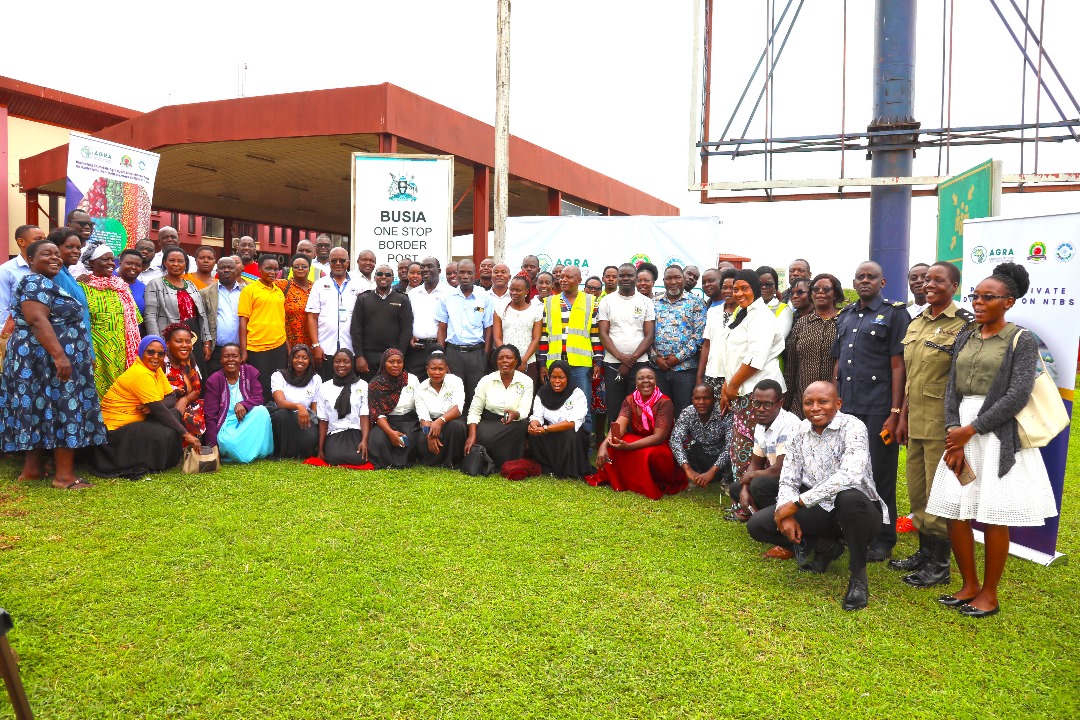Busia, 5th December 2024 — During the East African Business Council (EABC) – AGRA Public-Private Dialogue on Non-Tariff Barriers (NTBs) at the Busia One-Stop Border Post, women and youth cross-border traders called upon the Governments of EAC Partner States to eliminate fees and charges imposed by Plant Health, Standards Bodies, Phytosanitary, Counterfeit, Biosafety, Port Health, and Agriculture Food Authorities to ease trading in cereals and horticultural products under the EAC Simplified Trade Regime (STR).
Mr. Frank Dafa, EABC Manager for Trade in Goods, representing the EABC Acting Executive Director, Mr. Adrian Njau, stated that the EAC Simplified Trade Regime (STR) has enabled cross-border traders to access the Simplified Certificate of Origin, exempting consignments valued under USD 2,000 from import duties. However, the high fees and charges imposed by multiple trade facilitation agencies at the border undermine the purpose of the STR.
For the export of 2–5 tonnes of cereals between Uganda and Kenya, traders must navigate seven different trade facilitation agencies at the border, with inspection fees and testing charges totaling approximately Ksh. 20,000 (USD 200), which is around 10% of the consignment value.
Mr. Dafa urged EAC Governments to direct these agencies to eliminate fees and charges, noting that the costs, combined with unclear processes, transport, and logistics, are significant barriers for women and youth traders to benefit from using the STR.
The Public-Private Dialogue brought together 80 stakeholders, composed of 60 women and youth cross-border traders, trade facilitation agencies at the border, and officials from the Uganda Ministry of EAC Affairs and the Kenya Ministry of East African Community, Arid and Semi-Arid Lands (ASALs), and Regional Development.
Mr. Matia Etedu from the Uganda Ministry of EAC Affairs emphasized that agriculture, primarily conducted by women and youth, is the backbone of the economy and accounts for the highest intra-EAC trade.
Mr. Silvanus Nkanae, from Kenya Revenue Authority reported that the balance of trade of the two countries at the Busia border is one to one (1:1). Key Kenyan exports to Uganda include Irish potatoes, onions, and tomatoes, while cereals are the primary imports. Customs committed to printing and issuing the EAC Simplified Certificate of Origin free of charge to cross-border traders to encourage the declaration of consignments at the border.
Mr. Tumuhairwe Godfrey, from Uganda Revenue Authority highlighted that Joint Border Management Committee meetings have been instrumental in resolving trade barriers at the Busia border.
Mr. Dennis Osoro, from the Kenya Ministry of EAC Affairs, noted that the region has established an EAC NTB reporting and elimination mechanism and encouraged traders to visit trade facilitation agencies at the border for advice on standards and quality requirements for their export/import consignments.
Women and youth traders from Uganda raised concerns about Kenya’s excise duty on eggs, which has rendered them un-competitive halting the exports of eggs. Farmers and traders were urged to use seeds certified by the International Seed Testing Certificate Association and to adopt good agricultural practices and post-harvest techniques to avoid mycotoxin contamination and harmful pesticides.
Challenges raised by traders and clearing agents at Busia OSBP include system failures, inactive call centers, the lack of a mobile cargo scanner in Kenya, and un-gazetted roadblocks at Korinda Prisons, Suo, Mundika, and Total.
Following the successful dialogue, EABC, in partnership with AGRA, conducted capacity building for women and youth cross-border traders on trade facilitation under the EAC Simplified Trade Regime. This initiative is part of the EABC-AGRA project titled “Promoting Intra-EAC Agri-Food Cross-Border Trade by Addressing NTBs.”
During the capacity-building session, the EAC Secretariat provided practical training to cross-border traders on using the EAC NTB Reporting Mobile App, a tool designed to help traders report and resolve trade barriers. Stanbic Bank Uganda presented tailored financial solutions for women traders. Leading associations, such as Eastern African Sub-Regional Support Initiative for the Advancement of Women (EASSI), Kenya International Freight and Warehousing Association ( KIFWA), Uganda Clearing Industry and Forwarding Association (UCIFA) Kenya National Chamber of Commerce and Industry (KNCCI), Busia Women Cross-Border Association, Busia Men Cross-Border Association, Uganda Cross Border Traders’ Cooperative Union, Busia Kenya Cross-Border Traders Association, COMESA –EAC Cross Border Trade Information Desk, shared insights and experiences in cross-border trading.
The dialogue concluded with a commitment by Trade Facilitation Agencies to address challenges during Joint Border Management Committee meetings and streamline procedures to promote cross-border trade. EABC remains steadfast in presenting key policy recommendations from the dialogue to EAC Technical Committees for necessary policy reforms.
About East African Business Council: The East African Business Council (EABC) is the regional apex body of private sector associations and Corporates from the 8 East African countries. It was established in 1997 to foster the interests of the private sector in the integration process of the East African Community. EABC vision is a borderless East Africa for business and investment. The primary mission is to promote sustainable private sector-driven growth in the EAC. www.eabc-online.com
About AGRA
AGRA is an African-led organisation focused on putting farmers at the centre of the continent’s growing economy. AGRA advances uniquely African solutions to sustainably raise farmers’ productivity and connect them to a growing marketplace. Together with its partners—including researchers, donors, African governments, the private sector, and civil society—AGRA seeks to create an environment where Africa sustainably feeds itself.
































